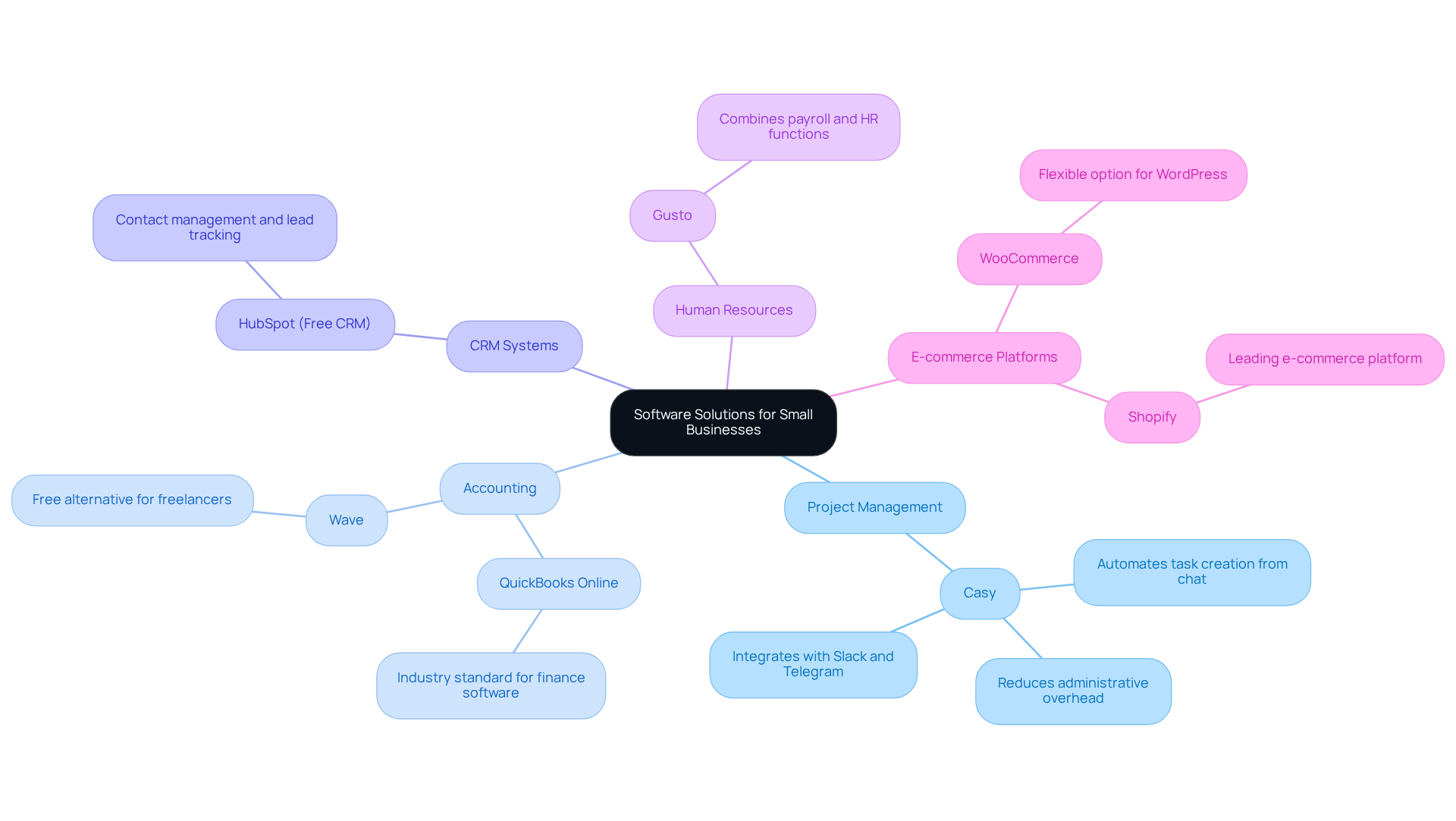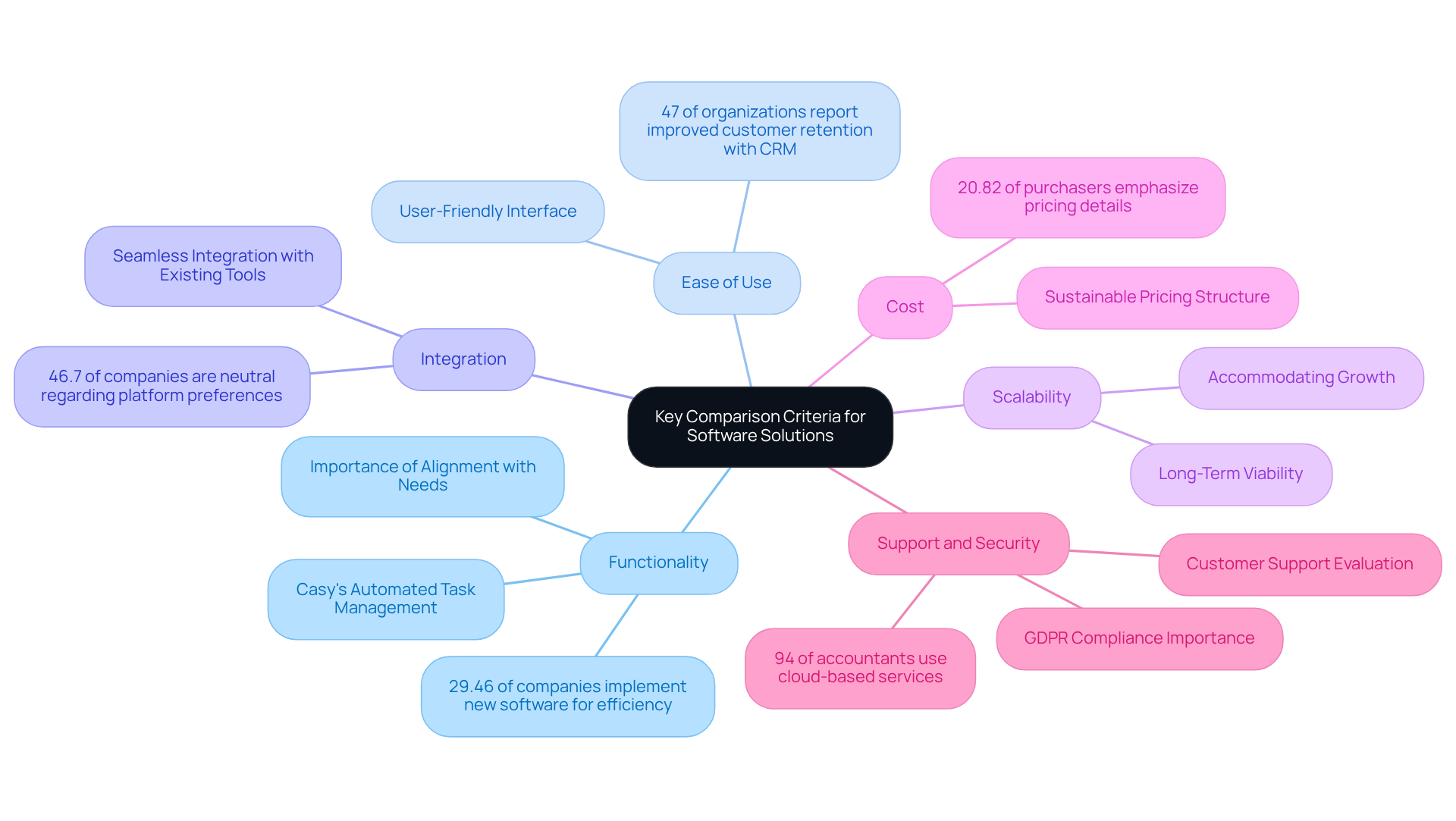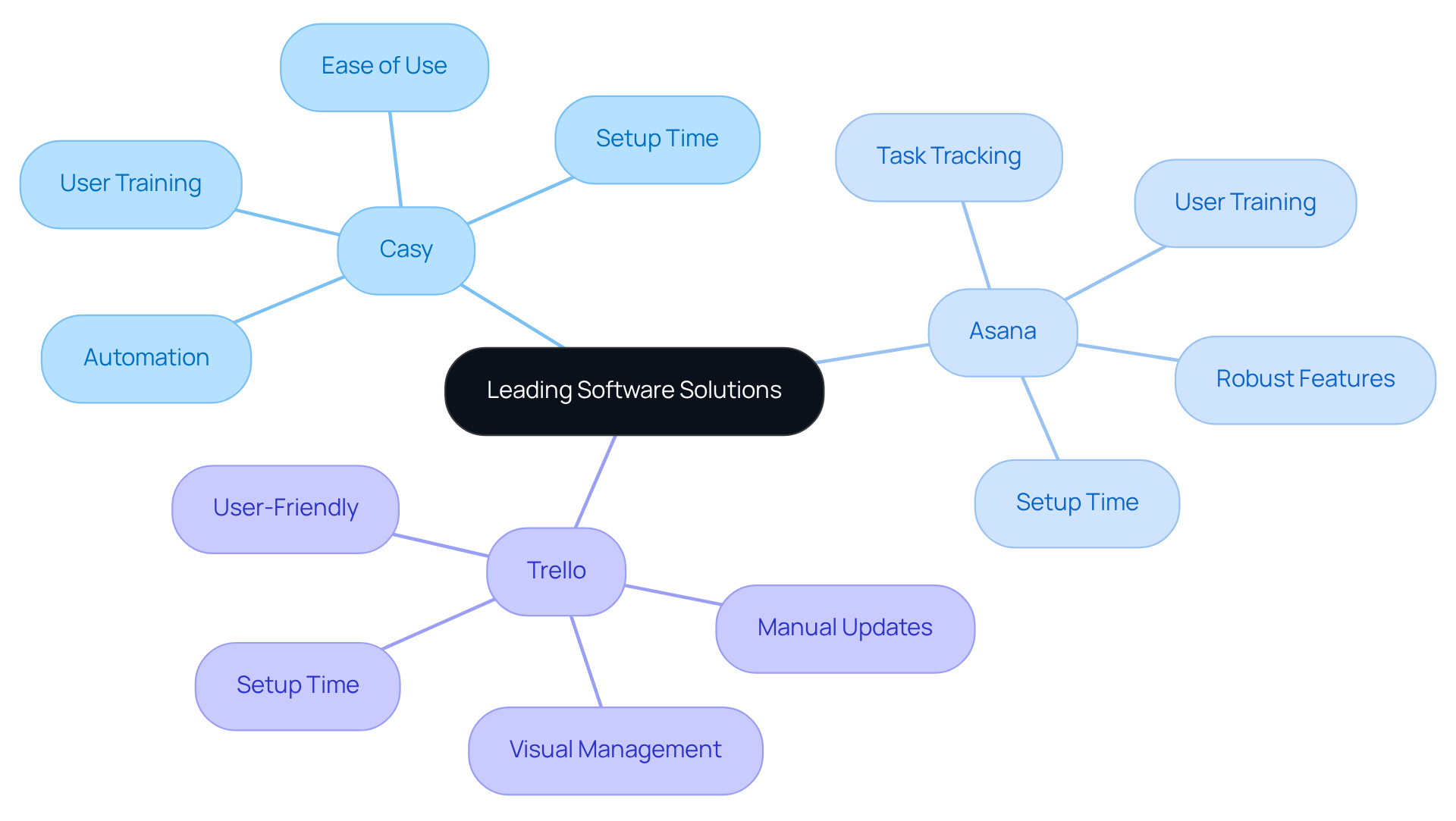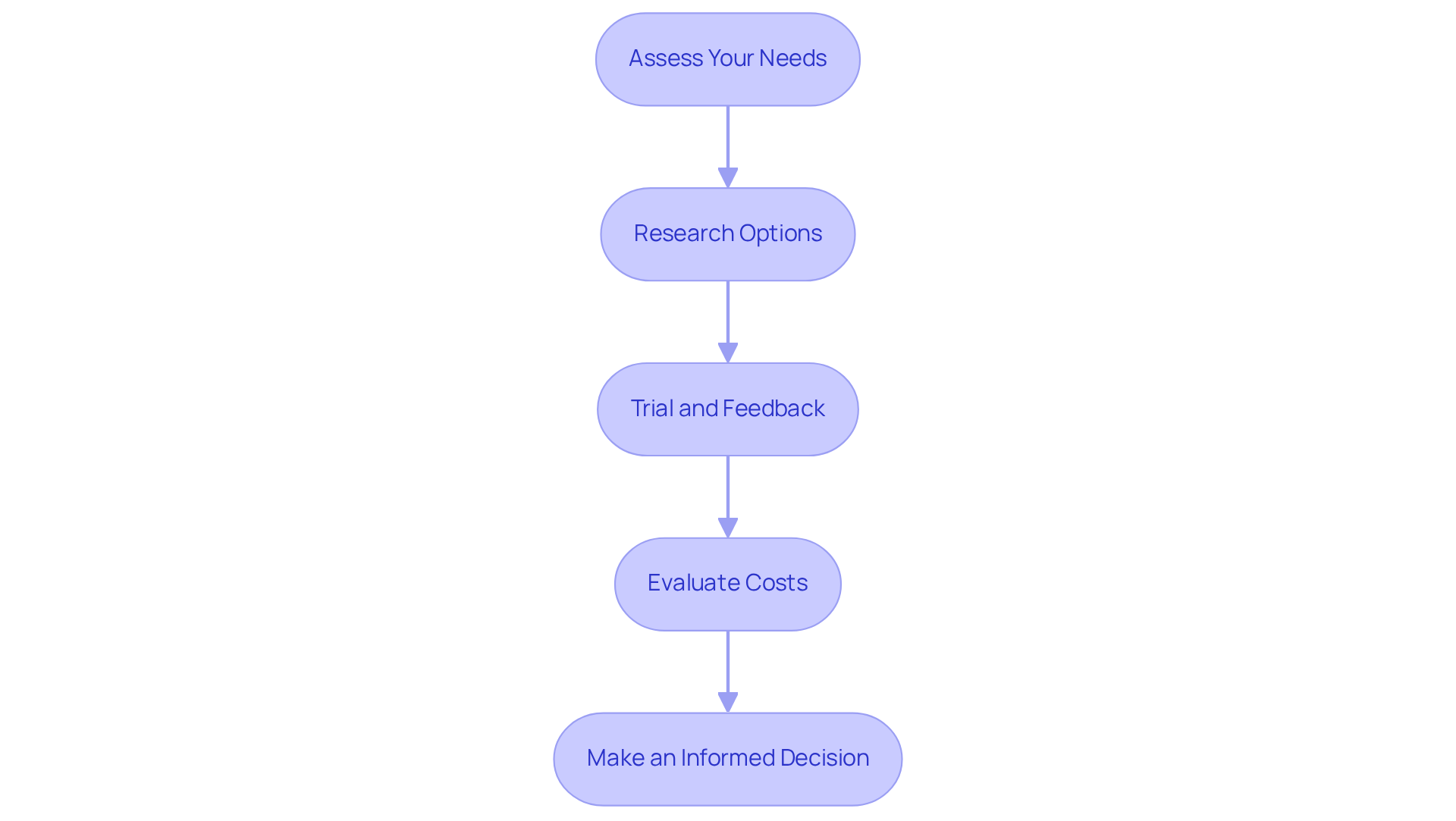Overview
This article provides a comprehensive comparison of essential software solutions tailored for small businesses, specifically spotlighting tools such as Casy, Asana, and Trello. It outlines the critical criteria for selecting the most suitable software. Understanding functionality, ease of use, integration, scalability, cost, and support is paramount for small enterprises. These factors are crucial in choosing software that not only enhances productivity but also aligns with their operational needs.
Are you equipped with the right tools to elevate your business? This overview invites you to reflect on your current software choices and consider how they meet your unique challenges.
Introduction
Small businesses are navigating an increasingly complex landscape where efficiency and productivity are paramount. The right software solutions can serve as a game-changer, offering tools that streamline operations, enhance collaboration, and ultimately drive growth.
But with a plethora of options available, how can small business owners discern which software truly meets their unique needs? This article delves into the essential software solutions for small businesses, comparing leading tools and outlining key criteria for making informed decisions that align with operational goals.
Understanding Software Solutions for Small Businesses
Small enterprises today face numerous challenges that can be mitigated through the adoption of software solutions for small business. These software solutions for small business include tools ranging from project management applications, which assist teams in organizing tasks and deadlines, to accounting programs that streamline financial processes. Additional categories include customer relationship management (CRM) systems, human resources management tools, and e-commerce platforms. Each application category serves a distinct purpose, addressing specific operational needs and enhancing overall productivity through software solutions for small business.
Consider project management tools like Casy, which automate task creation from chat discussions. This functionality allows teams to concentrate on their core activities, eliminating the burden of manual updates. Casy is particularly noteworthy for its ability to operate without extensive setup or manual input, significantly reducing administrative overhead and minimizing miscommunication.
With nearly 80% of small enterprises either employing or exploring AI technologies, understanding software solutions for small business is essential. This knowledge empowers founders to make informed decisions about which tools to adopt, ensuring optimal efficiency and growth as we approach 2025.

Key Comparison Criteria for Software Solutions
When evaluating software solutions for small businesses, several critical criteria must be prioritized:
-
Functionality: The application must align with the specific operational needs of the business. For example, Casy excels in automated task management, converting chat discussions into actionable tasks—crucial for groups aiming to streamline workflows. Notably, 29.46% of companies implement new software primarily to increase efficiency, underscoring the importance of functionality.
-
Ease of Use: A user-friendly interface is vital. Software that enables group members to adopt it quickly without extensive training can significantly enhance productivity. Research indicates that 47% of organizations utilizing CRM solutions reported improved customer retention rates, emphasizing the significance of usability in reaching corporate objectives.
-
Integration: The ability to seamlessly integrate with existing tools and platforms, such as Slack or Telegram, is crucial. This ensures that teams can maintain their current workflows while enhancing functionality. Furthermore, 46.7% of companies are neutral regarding specific platform preferences, indicating a flexible approach that can aid small enterprises.
-
Scalability: As companies expand, their software requirements will change. It's essential to choose solutions that can accommodate increased users or features, ensuring long-term viability.
-
Cost: The pricing structure should be sustainable for small businesses. With 20.82% of purchasers emphasizing pricing details, it’s essential to evaluate if the program delivers good value for the features available.
-
Support and Security: Evaluate the level of customer support available and the measures in place to ensure data security. With 94% of accountants utilizing cloud-based services, security and adherence to regulations like GDPR are crucial.
These standards will assist small enterprises in choosing the most appropriate software solutions for small business, ensuring they meet their distinct requirements while promoting growth and efficiency.

Comparative Analysis of Leading Software Solutions
In this comparative analysis, we will examine three leading software solutions for small business: Casy, Asana, and Trello.
-
Casy: Known for its automation capabilities, Casy integrates with chat platforms to create tasks from conversations, significantly reducing manual input. Is your team overwhelmed by administrative tasks? Casy is ideal for dynamic groups that require minimal setup and operational overhead.
-
Asana: A robust project management tool that offers extensive features for task tracking and group collaboration. While it provides great functionality, it may require more time for setup and user training compared to Casy. Are you prepared to invest that time for greater control?
-
Trello: A visual project management tool that uses boards and cards to organize tasks. It is user-friendly and excellent for smaller groups, but it lacks the automation features that Casy provides, which can result in more manual updates. Do you want to streamline your processes?
Overall, Casy stands out for its automation and ease of use, making it particularly suitable for startups and teams seeking software solutions for small business to minimize administrative tasks. Consider how these solutions align with your business needs and choose wisely.

Choosing the Right Software Solution for Your Business Needs
Choosing the right software solution requires a systematic approach:
-
Assess Your Needs: Clearly define the specific challenges your organization faces and identify the essential functionalities that will address these issues. Understanding your business's unique needs is critical to finding the right fit.
-
Research Options: Utilize comparison tools and user feedback to gather extensive information on various solutions available in the market. This research phase is vital for making informed choices.
-
Trial and Feedback: Take advantage of free trials to evaluate the program with your team, gathering feedback on usability and effectiveness. Businesses that utilize free product trial periods are more likely to make successful purchases, as they can test functionality and ease of use. This step is essential; companies participating in product trials significantly increase their chances of making successful acquisitions.
-
Evaluate Costs: Consider not only the initial expenses but also the long-term value and potential ROI of the application. A comprehensive cost assessment helps avoid remorseful acquisitions, with 42% of companies indicating they face unexpected expenses. Furthermore, 59% of worldwide companies regret at least one technology acquisition made in the past 18 months, underscoring the importance of thorough evaluation.
-
Make an Informed Decision: Based on the collected information and team input, choose the solution that best aligns with your operational objectives and budget. This informed decision-making process is essential, as successful purchasers are 25% more likely to consider prior product experiences when selecting applications.
By following these steps, small enterprises can ensure they select software solutions for small business that boost productivity and aid their growth trajectory. For instance, tools like Casy for project management and Zoho CRM for customer relationship management are excellent software solutions for small business that meet their requirements. As Brian Westfall, principal analyst at Capterra, states, "Software is integral to business operations, yet many organizations still struggle to make the right purchasing decisions.

Conclusion
In the realm of small business operations, integrating effective software solutions is paramount for enhancing productivity and streamlining processes. By understanding the diverse categories of software available—from project management tools to CRM systems—small enterprises can make strategic choices that align with their unique operational needs.
Critical criteria for evaluating software solutions include:
- Functionality
- Ease of use
- Integration capabilities
- Scalability
- Cost
- Support
Each factor plays a significant role in ensuring that businesses select tools that not only meet their current demands but also adapt to future growth. The comparative analysis of leading software solutions, such as Casy, Asana, and Trello, illustrates how different tools cater to varying business requirements, emphasizing the importance of choosing the right fit for specific organizational goals.
Selecting appropriate software solutions for small businesses is a vital step toward achieving operational efficiency and fostering growth. By assessing needs, conducting thorough research, and considering user feedback, small enterprises can navigate the complexities of software acquisition. Embracing the right technology empowers businesses to thrive and positions them for success in an increasingly digital landscape. The future of small business growth hinges on informed decisions regarding software solutions that drive productivity and innovation.
Frequently Asked Questions
What are software solutions for small businesses?
Software solutions for small businesses include various tools such as project management applications, accounting programs, customer relationship management (CRM) systems, human resources management tools, and e-commerce platforms, all designed to address specific operational needs and enhance productivity.
How do project management tools benefit small businesses?
Project management tools, like Casy, help teams organize tasks and deadlines, automate task creation from discussions, and reduce the burden of manual updates, allowing teams to focus on their core activities and enhancing overall efficiency.
What is the significance of AI technologies for small enterprises?
Nearly 80% of small enterprises are either using or exploring AI technologies, making it crucial for business founders to understand software solutions. This knowledge helps them make informed decisions about tool adoption, ensuring optimal efficiency and growth as they approach 2025.
What specific advantages does Casy offer as a project management tool?
Casy operates without extensive setup or manual input, significantly reducing administrative overhead and minimizing miscommunication within teams.




